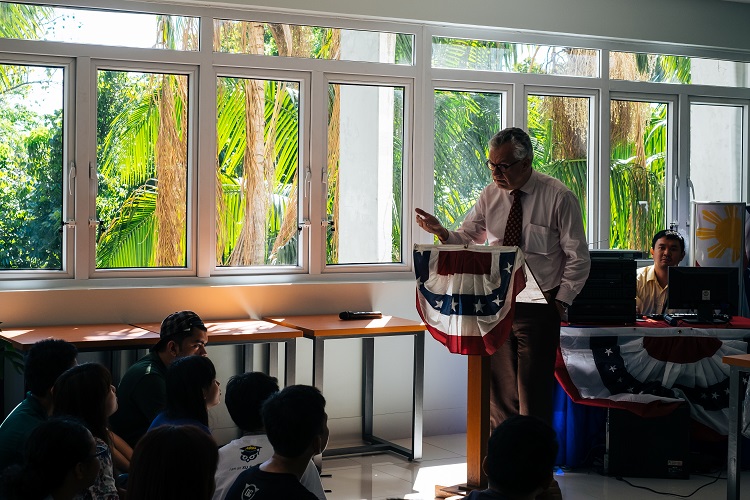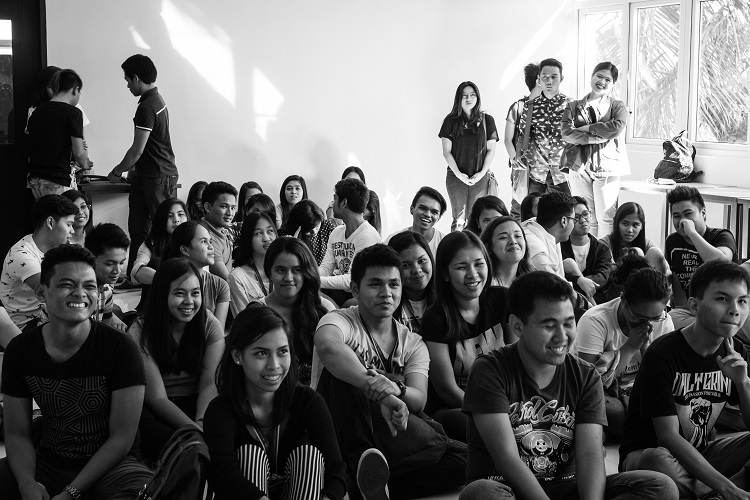
COVERING ELECTIONS. In a lecture with Development Communication students of Xavier University on January 27, three-time Emmy Awards winner and Northeastern University journalism professor Dr Alan Schroeder shares on how to cover elections responsibly to guide voters in choosing the country's next set of leaders.
Words by Stephen J Pedroza
Photos by David T Roa
CAGAYAN DE ORO CITY, Philippines — The messages of candidates during election season are not enough; it is imperative to scrutinize them with a critical eye to guide voters in arriving at informed choices, an internationally-known journalist pointed out in a discussion with Development Communication students of Xavier University, Wednesday, Jan 27.
“As journalists, our job is to communicate the messages of the campaign to the voters. Not just everything the [candidates] say but also to look at their campaigns critically and consider the context of what they say and help the voters understand if what they say is valid, truthful, or helpful,” said three-time Emmy Awards winner Dr Alan Schroeder, a visiting professor to the Philippines from the School of Journalism of Northeastern University in Boston.
“Voters, particularly, have a lot of needs; they need to hear from different sources. It’s not only enough to read a single newspaper or listen to a single radio program or watch one television show day after day in order to learn about the candidates,” said Schroeder, who was named among “The Best 300 Professors” by The Princeton Review in 2012.
Within his work in media and politics in the international level, Schroeder has lectured about the global phenomenon of televised political debates in many countries, has authored several books, and has testified before the British Parliament about debate structure and sponsorship.
“We really need a range of voices, a range of information in order to fully understand what is going on in the campaigns,” Schroeder shared.
“We need, as voters, independent journalists — journalists who do not work for the politicians, who are not part of political parties, who are not paid for by those political parties; because if they are, it becomes difficult to trust the reliability and the truthfulness of those messages.”
Parallels between US and Philippine elections
Similar trends between elections in the United States and the Philippines were also highlighted in his lecture at the XU Learning Spaces, Main Library.
“In the Philippines, you have a lot of political dynasties but we also have our own political dynasties in the US,” Schroeder said, citing some of the names of political figures from dynastic families. “It’s interesting that as distant as we are from each other geographically, there are some common trends between our two elections.”
The journalism professor likened Filipino presidential candidate Davao City Mayor Rodrigo Duterte to the Republican bet Donald Trump for their outspoken personas in public fora and debates.
Another parallel scenario is the citizenship dispute of PH presidential aspirant Sen Grace Poe and US Sen Rafael Edward “Ted” Cruz, who was born in Canada.
“It’s very important to be informed about these things, not just for ourselves but also in informing others about what is going on in the campaign so they can arrive at intelligent decisions,” he said.
Schroeder also cautioned the audience to keep in mind the three big groups to consider when covering campaigns: voters, candidates, and journalists.
“The voters are the most important people in the process. … Any election campaign must concentrate primarily on the needs and concerns of the voters. But sometimes, we forget about them, we forget to take them seriously as we ought to. Sometimes, the candidates themselves do not take the voters seriously as they should do.”

XAVIER DEVCOM. Professor Schroeder asks the DevCom students of Xavier from various year levels to analyze and interpret several campaign posters and slogans as part of his lecture on covering elections.
Visual literacy
One of the things Schroeder is specifically interested in as a journalism professor is the idea of visual literacy and visual storytelling or communicating messages with images.
“Voters and journalists also need to develop media literacy skills. When we think about campaigns and political coverage, a lot of those messages are being communicated not only in words but also in images: videos, graphic design, typography— all sorts of visual methods for conveying messages,” he said.
As an exercise, Schroeder asked the DevCom students to examine several campaign posters and slogans in terms of their color scheme, font face, the use of spaces and objects, among other criteria. “It becomes particularly important in the political context because as voters and journalists, these visual messages are being used in ways to manipulate our responses and, perhaps, play on our emotions, more than our intellect,” the professor remarked.
Schroeder has written about a variety of media-related topics for different outlets such as the New York Times, Financial Times, Washington Post, Politico, Boston Globe, Huffington Post, and the Guardian.
“One of the things we can do is to help our readers, listeners and viewers understand how simple visuals and simple imagery can be used to convey messages that are very manipulative and can persuade people but might not appear obvious by just looking at them.”
XU was the only university in Mindanao Schroeder visited as part of his lecture series in the country sponsored by the US Embassy in Manila, in partnership with Xavier's DevCom department.